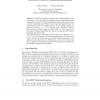Free Online Productivity Tools
i2Speak
i2Symbol
i2OCR
iTex2Img
iWeb2Print
iWeb2Shot
i2Type
iPdf2Split
iPdf2Merge
i2Bopomofo
i2Arabic
i2Style
i2Image
i2PDF
iLatex2Rtf
Sci2ools
ALGORITHMICA
2010
2010
Space Efficient Algorithms for the Burrows-Wheeler Backtransformation
The Burrows-Wheeler transformation is used for effective data compression, e.g., in the well known program bzip2. Compression and decompression are done in a block-wise fashion; larger blocks usually result in better compression rates. With the currently used algorithms for decompression, 4n bytes of auxiliary memory for processing a block of n bytes are needed, 0 < n < 232 . This may pose a problem in embedded systems (e.g., mobile phones), where RAM is a scarce resource. In this paper we present algorithms that reduce the memory need without sacrificing speed too much. The main results are: Assuming an input string of n characters, 0 < n < 232 , the reverse Burrows-Wheeler transformation can be done with
| Added | 08 Dec 2010 |
| Updated | 08 Dec 2010 |
| Type | Journal |
| Year | 2010 |
| Where | ALGORITHMICA |
| Authors | Ulrich Lauther, Tamás Lukovszki |
Comments (0)

